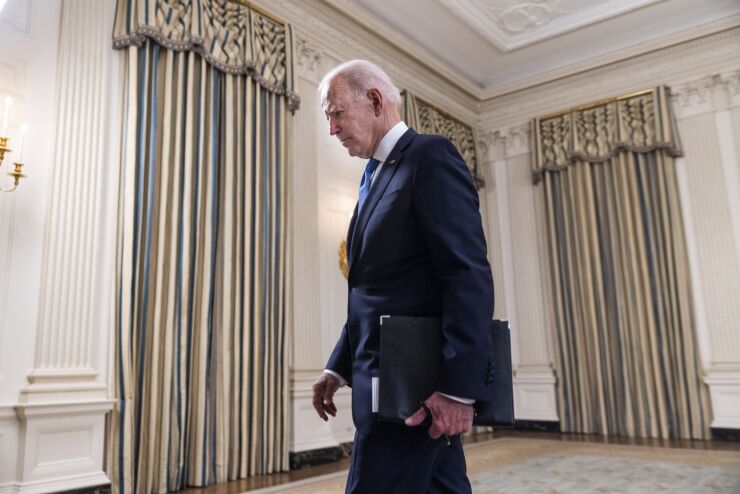President Joe Biden will likely be unable to keep one of his key campaign promises — to roll back his predecessor’s historically unpopular 2017 tax cuts — because of unyielding resistance among even some in his own party to raise taxes.
While Biden won applause on the campaign trail for pledging to repeal President Donald Trump’s tax overhaul on “day one,” as president he has run into the same political reality faced by Barack Obama, who kept the vast majority of George W. Bush’s tax reductions: raising taxes is a hard lift in Congress.
In Biden’s case, Senator Kyrsten Sinema of Arizona has loomed as the biggest obstacle. While she hasn’t spelled out her views in public, Democratic lawmakers attempting to craft a package of revenue-raisers to pay for the sweeping social spending bill to enact most of Biden’s economic agenda say she’s opposed tax-rate increases.

Biden has already acknowledged that there aren’t enough votes to raise Trump’s 21% corporate tax rate. The setback is ironic considering how Trump’s overhaul was a
“I’m surprised that it seems like the corporate rate is out,” said Alex Hendrie, the director of tax policy at Grover Norquist’s Americans for Tax Reform. “A lot of people around town assumed that it would go up.”
More about the tax package may be known later this week, with Senate Democrats planning to release their plan to fund what’s shaping up to be a near-$2 trillion social spending package.
The negotiations over revenue provisions are ongoing and there are many options for the wealthy and corporations to pay their fair share, according to a person familiar with the White House’s thinking. The ultimate plan will not add to the debt, the person said.
Enduring legacy
Trump’s tax law could end up being one of his most enduring policy legacies — transitioning the U.S. from having one of the highest corporate tax rates in the world to one of the lowest, after years of squabbling in Congress over how to address business taxation.
The 2017 Republican tax law took the corporate rate down to 21% from 35%, lowered the top tax rate for the highest-earning Americans to 37%, and made dozens of other changes that amounted to a $1.5 trillion net tax reduction over a decade.
Republicans say that the overhaul made the country more competitive, while critics have said it didn’t generate the promised economic growth and investment, and largely helped wealthy donors and corporate shareholders — deepening inequality.
Given historical support among Republicans for a corporate rate in the mid-20s, and the 2017 legislation’s unpopularity, Democrats had assumed a rate hike for companies would be the easiest part of the plan.
Senator Mark Warner, a Virginia Democrat, said last week it would be a “great irony” if his party embraced the Trump tax cuts.
Intense lobbying
Business groups including the U.S. Chamber of Commerce and the Business Roundtable have opposed Democrats’ attempts to increase tax rates. Corporate groups lobbied intensely for the tax breaks passed in 2017 and have fought Democrats’ attempts to roll back those benefits.
Sinema, who’s up for re-election in 2024, has already this year taken in more than the $2.3 million she raised in the 2019-2020 election cycle. Negotiators say she would support higher tax burdens on high-net-worth Americans and on corporations, just not through higher rates. Instead, Democrats are looking at corporate minimum taxes on financial profits and taxing the unrealized gains of billionaires.
Sinema’s office didn’t respond to a request for comment.
Democrats acknowledge that there is unlikely to be another large bill before the midterm elections next year. They are currently projected to lose their House majority next year — meaning it could be years before they have large enough margins to confront the corporate rate.
“The only way there is going to be action to make the tax system more fair is if there is a larger Democratic majority in the Senate,” said Brad Bannon, a progressive political strategist.
Political reality
The popularity of the higher corporate taxes means that Democrats are likely to continue to focus on that for years to come, but the political reality may mean it’s just a talking point. Some 59% of U.S. adults say they are bothered “a lot” by some companies not paying enough in taxes, according to
“The fair-share tax issue going forward is going to play a major role,” said Frank Clemente, the executive director of Americans for Tax Fairness, a progressive group. “That may not happen next year given a difficult election year, but that’s going to be the future agenda for everybody.”
Lawmakers on Capitol Hill aren’t yet making any predictions on whether they might be able to roll back Trump’s tax cuts at a later date. House Ways and Means Committee Chairman Richard Neal, a congressional veteran who has advocated for rate increases, said that inertia is a powerful force governing the tax code.
“It’s harder sometimes to get something out of the code sometimes than getting it in the code,” he said.
— With assistance from Bill Allison, Nancy Cook and Laura Litvan





